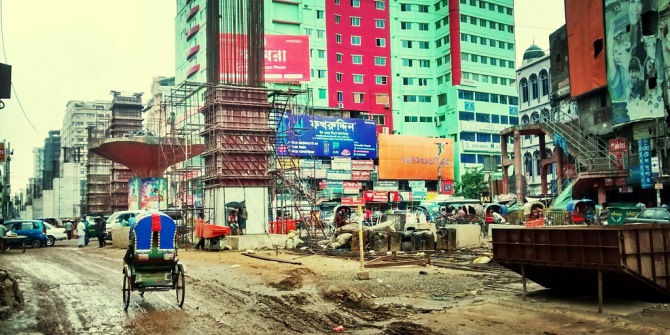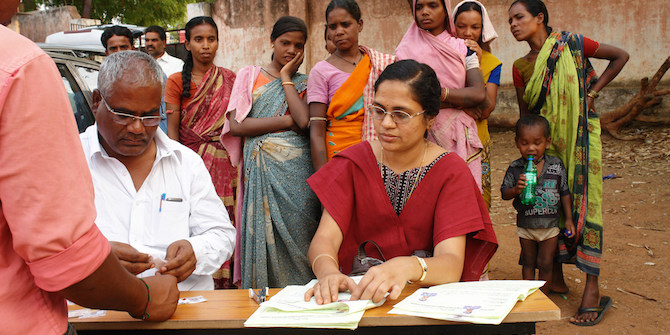In an exclusive interview, Lord Desai discusses India’s agrarian economy, corruption in New Delhi and his experiences at LSE.
Speaking at LSE earlier this year, Lord Meghnad Desai, Professor Emeritus of Economics at LSE, described the School as a place where “things are always happening because it’s connected to the City and simultaneously connected to politics.” This description could apply equally to Lord Desai, who has been at LSE for more than 30 years. He was appointed as a lecturer at LSE in 1965 on the eve of a student rebellion; in 1983, he became a Professor of Economics and went on to head LSE’s Development Studies Institute (1990-95) and found and lead LSE Global Governance (1992-2003).
During his time at the School, Lord Desai has researched and lectured on a variety of subjects: Marxian analysis, applied econometrics, Indian development and reform, poverty, globalisation, and the role of private markets. His engagement with economics and the social sciences is the subject of a new book, “Arguing About the World: The Work and Legacy of Meghnad Desai”, edited by LSE’s Professor of Global Governance Mary Kaldor and Dr Polly Vizard.
In an exclusive interview, Lord Desai discusses India’s agrarian economy, corruption in New Delhi, his experiences at LSE and more.
Q. In “Arguing About the World”, Professor Jagdish Bhagwati contrasts two narratives on the Indian economy: the optimistic narrative, which highlights the successes of neoliberal reform and the enormous potential for India’s growth rate; and the sceptical narrative, which argues that economic growth has spurred inequality. Are you an optimist or a pessimist on India’s economic potential?
A. I’m a short-term pessimist and a medium-run optimist. Some of India’s current economic problems are self-inflicted, resulting from the UPA II government’s inability to take risks and be decisive. But the real problem is corruption in the political structure and its intersection with business. The Indian economy’s strength derives from the private sector. But the bigger private entrepreneurs become, the more they are blackmailed and harassed by the political system. It is well known, though rarely documented, that political parties are financed by black money from corporates—this culture will be very difficult to dislodge.
To be clear, I don’t think that corruption affects economic growth—corruption is a moral issue, not an issue of economic efficiency. The question is why in the face of corruption the government seizes up and is unable to react or do anything. That paralysis is a problem.
Q. One of the chapters in “Arguing About the World” analyses your earlier work on Indian agricultural productivity. What do you think the future of India’s agrarian economy will be?
A. There is a political perception that India has to be predominantly agrarian because the secret of growth lies in agriculture. But the growth rate in agriculture is unlikely to go beyond three or four per cent. The most important thing is to make agriculture efficient and move labour out of agriculture and into industry. In terms of absorbing surplus rural labour, India has failed to industrialise properly. Rather than address this failing, India has implemented programmes such as the National Rural Employment Guarantee Act, which keeps people in the countryside.
There is also a reluctance to think about agriculture in a modern way. The agriculture ministry is very old fashioned. The Gandhian imagery of India as a country of 700,000 villages endures even though it’s complete rubbish. Farmers need modern technology, pesticides, mobile phones and better credit conditions. India needs a forward-looking agriculture minister who thinks of farmers as prosperous, educated, machine-oriented people.
This reframing will shift the focus towards the need for better warehousing, better marketing logistics, and better agricultural export products. India needs to get into more interesting agriculture than food grains—horticulture, vineyards, fisheries.
Q. Dr Vizard describes you as a ‘globaliser’ for supporting globalisation in all its aspects, including the free movement of labour and the extension of international law. Do you think globalisation can survive the protectionist policies resulting from the ongoing global recession?
A. I’m still a globaliser and champion the full freedom of movement of capital, labour, trade and migrants. My book “Marx’s Revenge: The Resurgence of Capitalism and the Death of Statist Socialism” is a globaliser’s book. The current economic crisis is very much a part of globalisation—globalisation made massive transfers of capital to countries like India and China possible. But the crisis also gives the global system a chance to restructure itself. In “Marx’s Revenge” I point out that Marx viewed crisis as a way for capitalism to solve its problems. In this crisis, the balance of economic power is shifting from West to East because the West is outspending itself. There’ll be severe costs for West to restructure itself, but it has to be done. Meanwhile, the people who have worked hard in Africa and Asia will get something out of the system.
Q. On the subject of crises, what major changes has the study of economics undergone during your time at LSE?
A. LSE was beginning to have a precise image as an econometrics department when I arrived in 1965. The School was hiring mathematical economists such as Denis Sargan, Harry G. Johnson and Terence Gorman to build up a powerful department, which did excellent research on the frontier of econometrics. During my time at the Department of Economics, a lot of new, young faculty came in from around the world – India, Europe, the United States – but the department always retained its technical mainstream image. Even when I was convenor of the department (1987-90), I did heterodox work, but I didn’t want anyone else to have to.
The best thing about the School was that it didn’t mind what you did as long as you did your academic work. I had tenure and published quite regularly, so I had the freedom to stray from my core competencies to work on other topics—Marxist theory, environmental economics. For that reason, it was great fun being at LSE.
Q. Why did you establish LSE Global Governance (previously known as the Centre for the Study of Global Governance)?
A. When Dr I.G. Patel was the director of LSE, he floated the idea of a multidisciplinary centre for teaching development. I was recruited internally and asked to design courses for the department (which became DESTIN). Meanwhile, one of [former LSE director] John Ashworth’s friends had asked the question, “if science can solve problems, why can’t social science?” By way of response to that query, we decided to start the Centre for the Study of Global Governance. There were no disciplinary boundaries at the centre, no orthodoxy. I enjoyed working there very much.
Q. What advice would you give to current students about pursuing interdisciplinary research?
A. Students at the undergraduate level should specialise and be secure in one discipline, while those at the post-graduate level can work across disciplines. Once you’re more mature, you can look at other disciplines in a non-superficial way. DESTIN was the first interdisciplinary department at LSE and it was successful because people came to it mid-career seeking more academic breadth. If students are academically mature, you can also design a more challenging course.
Q. You’ve previously described your book on Bollywood actor Dilip Kumar as your greatest achievement. What do you consider your greatest academic achievement?
A. The comment about the Kumar book is mostly facetious—I say that because I met my wife, Kishwar, while she was editing the book. My actual favourite book is “Marx’s Revenge”. That was a climactic book for me; it brought together all the political debates I’ve taken part in, whether in the context of political parties or student politics. I’ve tried to combine all my knowledge of politics, history and economics in that book, and its large bibliography now serves as a reference guide for me.
Q. Beyond academia, you’ve played an active role in politics (Lord Desai was Chairman, Holloway Ward Labour Party of the Islington Central Constituency from 1977 to 1980 and Chairman and President of the Islington South and Finsbury Constituency Labour Party). Did you find the academics or the politicians more sceptical of your efforts to juggle two careers?
A. The academics could not understand why I was doing politics and I always had to establish that I was still a serious academic. The politicians respected me for being an academic and still devoting time to them.
I found that my political work made me a better academic. A lot of economists give politicians advice, but then return to the isolation of their offices. By canvassing at doorsteps for the Labour Party, I found out how people live their day to day lives and it was an immense education for me. [Former Labour Party leader] John Smith used to say that the party trusted me not only because of my knowledge of economics but also because I had gone door to door arguing Labour’s case.









